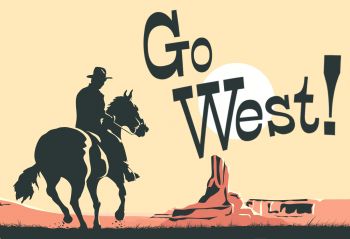Go West! 11•12•17
American Overture for Band, by Joseph Willcox Jennings
Joseph Willcox Jenkins (1928–2014) was born in Philadelphia and began composing music as a young child as part of his piano lessons. As a college undergraduate, he studied prelaw while also studying composition with Vincent Persichetti at the Philadelphia Conservatory of Music. After graduating in 1949, Jenkins decided to pursue composition and enrolled at the Eastman School of Music; he graduated with a master’s degree in 1951. The young composer was drafted to serve in the Korean War, and he became an arranger for the U.S. Army Field Band. While serving in that position, Jenkins composed “American Overture for Band” to fit the unique instrumentation of the Army Field Band. The piece features virtuosic French horn playing, rich melodies, and energetic passages and is the composer’s most well known work. In 1956, Jenkins became chief arranger and assistant consider of the U.S. Army Chorus, and in 1961, he began teaching music theory, orchestration, and composition at Duquesne University.
Cowboy Rhapsody, by Morton Gould (arr. David Bennett)
Morton Gould (1913–1996), heralded as a child prodigy, was well known as both a pianist and a composer. During the Great Depression, he played piano in New York City movie theaters and was the staff pianist when Radio City Music Hall first opened. He went on to compose music for radio shows and Broadway plays, as well as ballet companies and symphony orchestras. “Cowboy Rhapsody” was originally composed for orchestra and has been described as “straddling the line between tone poem and medley.” It features several famous cowboy songs, including “The Trail to Mexico,” “Little Old Sod Shanty,” “Old Paint,” and “Home on the Range.” The band version of “Cowboy Rhapsody” was premiered in 1940 by the University of Michigan Band under William Revelli, and the performance is said to have inspired Gould to write more music for band.
“Grandfather’s Story,” from The Red Pony Film Suite, by Aaron Copland
Aaron Copland (1900–1990) wrote the music for the film The Red Pony in 1948 on the studio lot in the San Fernando Valley of California. The film was based on John Steinbeck’s novella of the same title, published in 1933, which presents a series of vignettes about a 10-year-old boy, Jody, and his life on a small California ranch. Copland transcribed the original orchestra suite for band in 1966, including four of the original six movements. The third movement, “Grandfather’s Story,” provides a melancholy portrait of Jody’s grandfather, who constantly reminisces about the glories of his youth. Copland became interested in writing film scores both as a challenge to his craft and to make himself more well known among popular audiences. He looked carefully for the right projects and directors, however, due to his concern with how editing a film affected its music. Copland composed five film scores, three of which were nominated for Academy Awards. He won the award in 1949, the year in which The Red Pony came out, but for another film, The Heiress.
The Yellow Rose of Texas, Traditional (arr. Lewis J. Buckley)
“The Yellow Rose of Texas” is a traditional American folk song. The earliest version appeared in a songbook of plantation melodies published in 1853 by Edwin Pearce Christy, founder of a black minstrel show. During the Civil War, the song became popular among Confederate soldiers in the Texas Brigade, who modified the lyrics and adopted it as a marching song. In September 1955, Mitch Miller’s recording of “The Yellow Rose of Texas” became a number-one Billboard hit and stayed at the top of the charts for six weeks. Other well-known versions have been recorded by Elvis Presley and Willie Nelson, among others. Today’s soloist, Lee Dummer, is a long-time Medalist member and frequent soloist with the group. A native of St. Peter, Minnesota, Lee performed with the Eastman Wind Ensemble before being selected as a member of the U.S. Army Band (Pershing’s Own). He has appeared with various orchestras and ensembles, including the Minnesota Orchestra.
Euphonium Soloist, Lee Dummer
El Capitan, by John Philip Sousa (arr. Brion/Schissel)
John Philip Sousa (1854–1932), the composer who would become known as “The March King,” began his career in the U.S. Marine Band at age 13, serving as an apprentice. He became leader of the Marine Band at age 26 and served in that position for 12 years, when he resigned to form his own band. Sousa had the ability to lead and conduct talented musicians, and he also developed a flair for writing marches. By the time of his death at age 78, he had composed 136 marches, along with a variety of other works. The march “El Capitan” is actually based on themes from one of Sousa’s operettas: a three-act drama by the same name that premiered in 1896. It was the most successful of Sousa’s theatrical compositions and enjoyed a lengthy run on Broadway before touring almost continuously for four years.
Intermission
Sunrise at Angel’s Gate, by Philip Sparke
Philip Sparke (b. 1951) was born in London and studied composition, piano, and trumpet at the Royal College of Music (RCM). He played in the RCM wind ensemble and formed a brass band; he also composed several works for these ensembles. Other compositions soon followed, and growing interest in his work led to a number of commissions and awards. “Sunrise at Angel’s Gate” was commissioned by the U.S. Army Field Band, conducted by Colonel Finley Hamilton, and first performed by the group in 2001. Sparke was inspired to write the piece after visiting the Grand Canyon. He wrote: “Sunrise and sunset are the best times to view the Canyon, as a sun low in the sky casts shadows that give depth and form to the vast panorama. Angel’s Gate is one of the many named rock formations on the northern side of the Canyon, and in this piece, I have tried to depict the sights and sounds of dawn there, birdsong in the early morning sky and the gradual revelation of the Canyon itself as sunlight reaches into its rocky depths. The faster central section depicts the arrival of the tourist buses, which run back and forth along the Southern Rim, and towards the end of the piece, to the sound of a tolling bell, we are reminded of the dangers that the beauty of the Grand Canyon so cleverly hides.”
Western Overture, by Thom Ritter George
Thom Ritter George (b. 1942) was born and raised in Detroit and displayed his musical talents at a young age. He wrote his first piece at age 10 and conducted his first orchestra concert at age 17. George earned bachelor’s and master’s degrees in composition from the Eastman School of Music and a doctorate degree in museum arts from the Catholic University of America. After graduating from Eastman, George was appointed as a composer/arranger for the U.S. Navy Band in Washington, DC—a position he held from 1966 until 1970. He later served as conductor of the Quincy (Illinois) Symphony Orchestra (1970–1983) and the Idaho State Civic Symphony (1983–2007). Since 2007, he has worked solely as a guest conductor and composer. George composed “Western Overture” in 1966 while with the U.S. Navy Band. Described as a “colorful work,” it was inspired by the composer’s visit to Kansas in June 1964. During his career, George has composed more than 360 pieces, ranging from simple songs to major symphonic works.
The Cowboys, by John Williams (arr. James Curnow)
John Williams (b. 1932) was born in New York and moved to Los Angeles with his family at age 16; after graduating from high school, he attended UCLA and began studying composition. After serving in the U.S. Air Force, Williams moved to New York to attend the Juilliard School, but he later returned to Los Angeles to score music for film and television. During his celebrated career, Williams has composed the music and served as the music director for nearly 80 films. The film The Cowboys, released in 1972, starred John Wayne as a grizzly, aging rancher who resorts to training a group of schoolboys to move a herd of cattle after his crew abruptly quits to join in the gold rush. Williams’s score for the film ranges from energetic and boisterous to sweet and tender; the sweeping overture captures both the rolling plains and the rhythmic galloping of horses. Critics have noted that Williams’s score contains elements of Aaron Copland and Leonard Bernstein.
The Magnificent Seven, by Elmer Bernstein (arr. Roy Phillippe)
Elmer Bernstein (1922–2004) was born in New York and as a child performed as a professional dancer and actor. He attended the progressive Walden School in Manhattan and received a scholarship to study piano with an instructor from Juilliard. Although he was not related to well-known composer and conductor Leonard Bernstein, the two men were friends and even had somewhat similar appearances. In New York’s world of professional music, Elmer was known as “Bernstein West” and Leonard as “Bernstein East.” (The two also pronounced their last names differently: Elmer BERN-steen and Leonard BERN-stine.) Elmer Bernstein wrote the theme songs and other music for two Broadway musicals and more than 200 films and television shows. By far his best-known composition is the theme from the movie The Magnificent Seven, released in 1960 and starring Yul Brynner, Charles Bronson, and Steve McQueen. The theme was nominated for an Academy Award but lost to Ernest Gold’s Exodus. Bernstein’s iconic theme was even one of his own favorites. He wrote, “Every once in a while—it doesn’t happen often—you hit on something really quite thrilling.”
Program notes by Susan Freese
Upcoming Performances
Join our mailing list
Subscribe to our email newsletter to learn about upcoming concerts.


